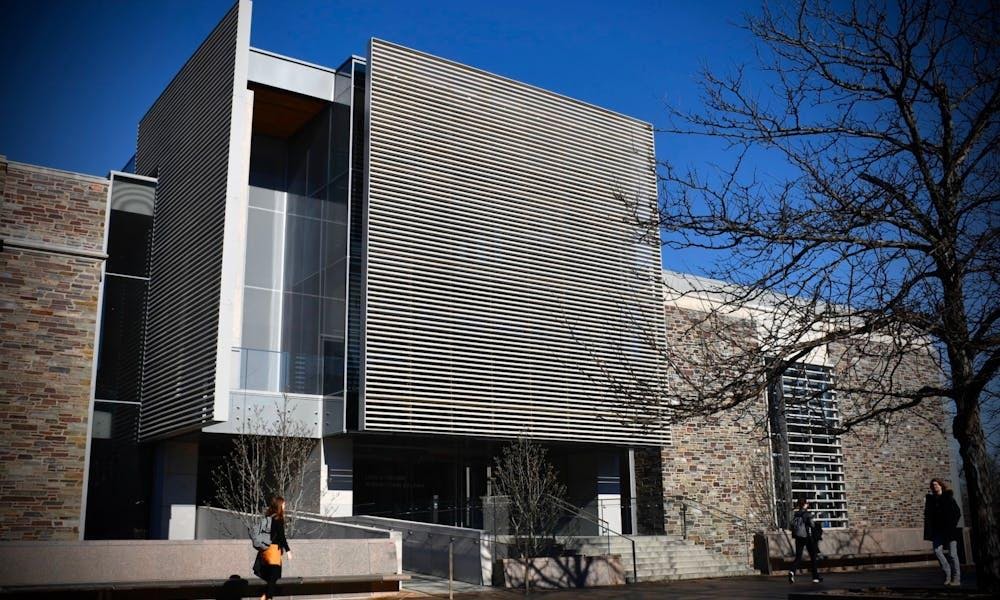The third bargaining session between the Princeton University Postdocs and Scholars-United Auto Workers (PUPS-UAW) union and the University, held on Tuesday, Dec. 3 in the Louis A. Simpson International Building, saw marginal negotiating progress.
Most of the three-hour meeting focused on disagreements between PUPS-UAW and the University on ground rules for bargaining, including disagreements over the number of observers — an issue from previous sessions. This meeting is a marked contrast to the first two bargaining sessions, where negotiations were unable to start. The postdocs eventually presented the University with a list of bargaining goals, including on salaries, housing, and healthcare and benefits.
During the negotiations, approximately 25–30 postdocs protested outside, and received written warnings from Free Expression Facilitators.
The union agreed to the University’s limit of five observers for this meeting, but did not make an agreement for future meetings, according to union organizing committee member Jessica Ng. In a written statement to The Daily Princetonian, University spokesperson Jennifer Morrill wrote that the five observer cap was a “compromise.”
“The University continues to believe that limiting negotiations to the designated bargaining teams for the Union and the University is most likely to further the parties’ shared interest in fair and efficient negotiations,” she added.
PUPS-UAW has stressed the importance of having as many observers as possible, including through an opinion piece in the ‘Prince’ published before the meeting. According to bargaining committee member Judy Kim, this demand is “purely for transparency.”
“It’s really important that postdocs are able to observe and see what’s happening,” she said.
Other proposed ground rules by the University include a prohibition on photos, videos, real-time updates, and recordings of the meeting, as well as official minutes and records. Observers must also return any documents they receive during a bargaining session.

“They kept insisting they’re not against transparency, but could not answer why they were,” Kim said.
According to Morrill, “Both the University and the members of the Union have selected bargaining teams to represent their interests at the bargaining table, and those representatives are free to report to their constituents the details of bargaining sessions and/or contract proposals.”
Sally Xie, an observer at last week’s session, told the ‘Prince’ the University also wants a “blanket ability to ban observers that behave disruptively.” According to the University’s proposed rules, “The University reserves the right to disallow the presence of any or all observers should there be repeated or egregious violations” of the proposed rules. This includes preventing observers from speaking or disrupting negotiations.
Morrill did not comment directly on this policy, but wrote, “Enforcing established ground rules … would also further the parties’ interests by enabling efficient and productive bargaining sessions.”

According to Kim, another article proposed by the University would require postdocs to check with their supervisors before attending bargaining sessions. According to Morrill, the intention behind this was to ensure that “attendance will not interfere with their workplace duties and responsibilities.”
“It felt really condescending,” said Xie.
Kim told the ‘Prince’ that the University “really didn’t have a good rationale for any of these restrictions.”
“I think everyone deserves to be in that room to see what’s going on, because until you’re there and seeing how they respond to the actual issues that we’re bringing up, I don’t think people just realize how little the University knows about the postdocs’ working conditions,” Xie said.
In the last hour of the three-hour long session, the group moved onto mandatory subjects, which encompasses bargaining that both parties are legally obligated to discuss in good faith, such as wages and working conditions. Ground rules are non-mandatory subjects.
The bargaining committee presented the University with nine proposals on “non-economic issues,” including timely reimbursement for travel. They also presented their “initial bargaining goals,” a summary of issues they hope to address at future meetings. The goals are organized into six categories: salaries, housing and transportation, benefits, workplace protections, workplace support, and union rights. The University is set to respond in the next meeting on Tuesday.
At 10 a.m., members of PUPS-UAW protested outside the bargaining room, holding signs that read, “Princeton, Princeton, you can’t hide. Open bargaining is our right,” and “Princeton postdocs work all day, we want housing, higher pay.”
According to Ng, who was one of the protesters, Free Expression Facilitators gave the protesters notices saying they were violating the University’s protest policy.
She added that protesters were initially told that the size of their group was too big. When they walked into the building individually and in pairs, they were told that the signs were the issue. Ultimately, the protesters walked back in as a group without any signs, and walked around outside the bargaining room.
“It was really just organically evolving with the situation,” Ng said. “We were at every point trying to understand the parameters of our protest and do what we could to still make it effective and visible.”
Kim stated that the protest was not disruptive inside the room. Comparing it to ones at other institutions she attended — including Yale, Johns Hopkins, and Georgetown — she said this was “one of the more wholesome, mild approaches I’ve ever seen.”
Ng told the ‘Prince,’ “It did feel like a sort of double layer of suppression, like we’re being excluded from the bargaining room and then we're also being excluded from being able to just express our discontent about that.”
Nikki Han is a News contributor for the ‘Prince.’
Please send corrections to corrections[at]dailyprincetonian.com.








